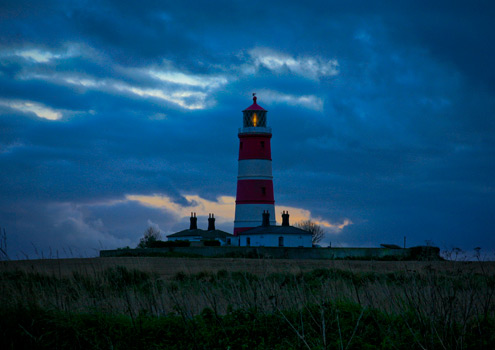Happisburgh on the Norfolk Coastline has many a treat in store
Happisburgh – a magical corner of the north Norfolk coast
Ever fancied staying overnight in a 1901 signal box built for a railway that never came? Not the sort of question you get asked every day, I know, but if you like your adventures a little different and want to meander off that well-worn beaten track, you could do a lot worse than fetch up at the Hill House pub at Happisburgh (pronounced Haysborough) on a remote stretch of the north Norfolk coast.
Lovingly run by Clive and Sue Stockton, this exceptional hostelry is one of the very few that make it onto my list of establishments which are actually run for the benefit of the patrons. My first taste of this homely welcome was during the drive down to Norfolk, some six hours from my home in Lancashire, on a Friday evening. Knowing full well that we’d be lucky to arrive in time for last orders, we phoned on ahead and advised Sue of our slow progress.
“Have you eaten?” she inquired, completely unfazed.
“No,” we replied, rather sheepishly.
“Don’t worry – you must be starving. I’ll make you something nice when you get here.” You could feel the smile on her face even over the phone.
And sure enough, on our eventual arrival we were shown straight to our quarters where we quickly dumped our bags, and within ten minutes were enjoying a glass of real ale while anticipating a culinary treat from Sue’s kitchen.
The signal box itself was superb. Still almost completely original, it is situated in the pub grounds, making it a real hideaway. For the thirty quid or so per night tariff, the accommodation was bountiful, but it would be a sin to make cheap bed and board your main reason for being here; this is a chance to stay somewhere beyond your wildest imaginings, and in a location which is both remote and stunningly beautiful. The signal box’s spooky, nostalgic charm makes it one of the most exciting places I’ve ever stayed, although at times I was convinced I’d been caught up in the creepy drama of the forties film The Ghost Train, half expecting Arthur Askey to pop out at any moment with his immortal “Hello playmates!”. Apart from two ample rooms over the pub itself, there’s also an original coach house which has been converted into a stylish, ground level apartment. Deliciously quirky, the bar has a more important claim to fame: it was a holiday favourite of Sherlock Holmes creator Sir Arthur Conan Doyle, and it is thought he actually penned The Dancing Men whilst on holiday in the village. Happisburgh itself actually doubled as Aldeburgh (although called Seaburgh) for the 1972 BBC film version of M R James’s classic ghost story, A Warning to the Curious.
After a comfortable night, a day of exploring was heralded by one of Sue’s mean fry-ups over at the pub – a true touch of breakfast heaven! Replete, we made for the nearby sea front, with its raw and rugged cliffs. The battered skeleton of 1950s ‘Hold the Line’ defences which snake up and down the beach is now almost completely impotent in the war against coastal erosion; little Happisburgh doesn’t seem to matter anymore to the powers that be, and the village has been consigned to its fate. As the great north sea pounds its way inexorably landwards, it devours a few more metres of land every month, and with it go livelihoods, homes and heritage.
At nearby Cliff House, a bed and breakfast establishment literally holding on by the skin of its teeth, Diana Wrightson has no choice but to sit and watch her home and her business slip away as disaster edges closer by the day. “We’ll stay open as long as we can,” she told me, “but we may not see another season. We lost eight metres in one night during a particularly nasty storm a few weeks ago.
“I used to offer guests either a view of the lighthouse or a sea view – now I can offer them both!”
And when, along with many others, Cliff House finally topples into the advancing ocean, there won’t be one shred of compensation for devastated residents. The 15th century church of St Mary is only a stone’s throw away, as is the striking red and white striped lighthouse, built in 1790; there is presently nothing in place to protect either of these historical edifices.
But despite their fierce battle, villagers remain proud and focused, always with a warm smile and hearty welcome for the visitor. Waiting for us back at Hill House was a delicious meal and more of that beautifully kept ale – something for which the venue has quite a reputation, especially at Clive’s summer beer festival every June.
“We started the event in quite a small way,” he told me, “but each year it gets more popular – we’ll be running out of space soon!”
But with the boundless hospitality of these wonderful hosts, you just get the feeling that they’d always squeeze you in somewhere.
What a breath of fresh air.
Popularity: 21% [?]
You can leave a response, or trackback from your own site.

Got something to say..? Leave your thoughts...

- Eat by the Fountain of Knowledge in Leuven, overlooking Grote Markt
- A Warning to the Curious in Aldeburgh, Suffolk: East Anglia’s ghost trail
- Whitby, for literary romance, North Yorkshire culture, or fantastic fish and chips
- The Moor of Rannoch Hotel – perfection in a perfect place
- Uncovering Belfast’s Thriving Culinary Scene















